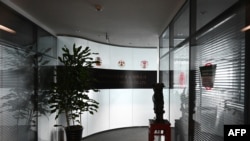Beijing is sending conflicting signals to foreign companies by telling those offshore that the country is reopening while arresting employees of foreign companies already operating in China, experts say.
The contradictory messages suggest China is trying to recover economically from three years of COVID-19-related isolation while still exerting control over the business sector. China’s economy grew 3% in 2022, according to official figures, short of Beijing’s 5.5% target. In the decade before the pandemic, China’s economy grew an average 7.7% a year.
“Part of this is because Chinese leaders likely perceive that China’s economy needs a major rebound in investment and consumption,” said Gerard DiPippo, a senior fellow with the Economics Program at the Center for Strategic and International Studies, in an email to VOA Mandarin this week.
“And they really need the private sector to lead that because localities’ fiscal resources are too constrained for another round of state-led stimulus.”
China’s new premier, Li Qiang, said Thursday that China’s economic recovery gained steam in March as he tried to reassure foreign companies that the country is committed to opening to the world.
“No matter how the world situation may evolve, we will stay committed to reform, opening up and innovation-driven development,” Li said. “We welcome countries around the world to share in the opportunities and benefits that come with China’s development.”
His message came days after Chinese Commerce Minister Wang Wentao met executives from 11 multinational corporations including Apple, Nestle and BMW.
The state-affiliated Global Times reported on the meetings on Monday, saying they had “sent a clear signal on China's unswerving commitment to opening-up, and is testimony to China's increasing role as a magnet for foreign investors.”
The news outlet compared the “concrete welcoming gesture” to the actions of Washington, “which has spared no effort to suppress Chinese companies in the U.S.”
Members of the U.S. Congress had grilled the CEO of the embattled Chinese-owned app TikTok days earlier.
Although Beijing began sending business-positive signals early in March, China’s draconian “zero-COVID” policy over the past three years had made the huge Chinese market less alluring than it had been for foreign companies, especially start-ups and small businesses.
According to the EU SME Centre, inquiries from small and medium-sized companies interested in entering China fell about 18% last year.
A survey released by the American Chamber of Commerce in China earlier this month shows that for the first time in 25 years, U.S. companies no longer regard China as the primary investment destination it once was.
Last week, Chinese authorities closed the Beijing office of Mintz Group, a U.S. due diligence firm, and detained five Chinese employees on suspicion of illegal business operations. [[ ]] An employee at Japan's Astellas Pharma was also detained on suspicion of espionage.
On March 17, the Chinese Ministry of Finance imposed a three-month suspension of business on professional services firm Deloitte’s Beijing branch with a fine of $31 million.
Anna Tucker Ashton, director of China corporate affairs at the Eurasia Group, a political risk management company, told VOA Mandarin via email Wednesday, “China’s central government has spent the past few months emphasizing to the foreign business community that it is welcome in China and trying to assuage international business concerns about the operating environment. These high-profile arrests of employees of foreign companies come at an odd time."
Ashton said the detention of employees of the American and Japanese companies raised concerns about whether geopolitical factors were involved.
“There has been some attention paid to the fact that the Mintz Group is an American due diligence firm. It helps businesses ensure they are in compliance with applicable laws, which undoubtedly include US laws that China’s government views as discriminatory. US companies operating in China have faced growing challenges navigating political and legal contradictions at home and in China, and due diligence firms are on the front lines of some of those conflicts,” she said.
“Japan is a close ally of the U.S. and relations between China and Japan are strained, so the arrest of the Astellas employee has also prompted questions as to whether geopolitics has anything to do with the situation,” she added.
Ashton said that while these incidents on their own may not prove consequential, if they turn out to be part of a bigger trend and more employees of foreign company employees are arrested, businesses may be spooked and stay away.
“Likewise, if Chinese authorities continue to withhold details on the reasons for these recent arrests, that too may have a chilling effect,” she added.
DiPippo said foreign investors and companies were already wary of possible arbitrary regulatory or legal decisions by Chinese authorities, especially with the ups and downs in China's COVID-19 prevention policies last year.
He added that for China's top leader, Xi Jinping, economic development is important, but it has taken a back seat to national security and long-term strategy. In a speech earlier this month Xi said, "Security is the foundation of development, and stability is the premise of prosperity."
For many foreign investors, this means that their needs will be put on the back burner, according to DiPippo, because Xi’s top priority is to speed up indigenous technological self-sufficiency while lowering risks for the financial sector.
“One’s outlook for the business environment is downstream of one’s expectations for China’s broader political trajectory and geopolitical risks,” DiPippo said. “Unfortunately, I do not see many reasons for optimism for the latter.
“Thus, I would expect the environment in China to become increasingly suspicious of foreign — especially American — investors except insofar as those firms are making priority investments or possess valuable technology."





